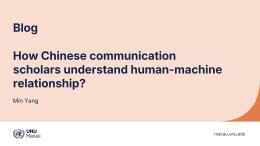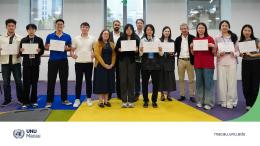The 2024 ACUNS Annual Meeting, cohosted at the United Nations University and the University of Tokyo, convened from June 20-22 to address the theme “Global Governance and Sustainable Development: Revitalizing Research to Support Multilateral Solutions.” The meeting encompassed numerous sessions exploring different aspects of the theme, including a roundtable entitled “It Takes a Village to Raise GenAI: Exploring GenAI’s Impacts on Education and Research.”
Chaired by Jingbo Huang (UNU Macau), the session featured a panel of experts, including Francesco Foghetti (UNU Centre), Jonghwi Park (UNU-IAS), Mark Ray and Stephen Ta’Bois (Government of Cayman Islands), and Antonios Saravanos (New York University). This is Part 2 of the series.
As generative AI rapidly integrates into educational systems worldwide, the Cayman Islands offers a unique perspective as a nation navigating both the challenges and opportunities presented by these new technologies. With its relatively small population and education system, the Cayman Islands can act as a microcosm for understanding how generative AI is transforming classrooms, reshaping teaching methods, and impacting student learning outcomes.
Mark Ray and Stephen Ta’Bois from the Cayman Islands' education sector have witnessed firsthand the swift pace at which generative AI tools have entered schools. They share their observations and insights into how these technologies are influencing teaching, learning, and the broader educational landscape.
A Delicate Balance: Opportunities and Concerns in Schools
Since generative AI became widely accessible, schools in the Cayman Islands have experienced a noticeable shift. Initially, there was excitement around the potential for these tools to enhance learning, but educators quickly recognized the challenges that came with it. As Mark points out, “There was a noticeable societal impact moving from initial excitement to a realization of some of the wider implications.”
Stephen adds that while large multinational vendors struggled to keep up with the pace of AI development, local schools began leveraging generative AI to assist with lesson planning and resource creation. This has helped teachers save time and introduce fresh ideas into their classrooms. However, Stephen also raises important concerns about data protection, as teachers must be mindful of the information they share with these platforms, which may breach privacy laws if mishandled.
One notable success has been the introduction of an AI-based math tutoring platform for students with the greatest needs. This program, initially launched as part of a summer school initiative, has shown exceptional results, prompting plans to expand it. Stephen highlights the importance of stakeholder engagement, explaining that “Where we see good parental, student, and teacher engagement, we often see very positive improvements.”
Leveraging AI for Localized Learning
Beyond improving classroom efficiency, generative AI offers the potential to address some of the Cayman Islands' specific educational needs. Mark sees an opportunity to create engaging and localized learning materials, particularly focused on Caymanian history, culture, and heritage. These materials, which are often hard to find at the appropriate level, could be generated through AI tools to offer authentic, interactive learning experiences. However, as Mark emphasizes, “It is imperative that the Cayman Islands and its people retain data ownership, as our culture and heritage are precious resources.”
Stephen echoes this sentiment, noting that as a small nation, the Cayman Islands can adapt more quickly than larger countries to emerging technologies. This could pave the way for the introduction of courses in prompt engineering and other AI-related skills, which are becoming increasingly important in today’s global economy.
Challenges in a Digital Age: Ethics and Implementation
Despite these opportunities, the rapid adoption of generative AI has introduced several challenges. Stephen notes that students using AI to generate coursework can undermine the learning process if not carefully monitored. There are also concerns about data privacy and the ethical implications of using AI tools, particularly when students and teachers may unknowingly upload personal information.
Additionally, the need for comprehensive AI policies is pressing. Mark and Stephen both stress the importance of developing clear guidelines and frameworks to govern the use of AI in education. As Mark points out, “the challenge is not just about creating policy, but having the manpower and resources to implement it effectively.”
The Path Forward: Building Capacity and Competence
For the Cayman Islands, the future of AI in education hinges on building capacity across the board. As Stephen observes, “The swift and constant development of generative AI skills is crucial for students, educators, and parents alike.” This requires not only technical skills but also the ability to critically analyze AI-generated content—a skill that is becoming increasingly important as fabricated information proliferates.
Mark and Stephen also highlight the need for collaboration between different sectors, including education, government, and industry. By working together, they hope to create a cohesive approach to AI policy that supports both the growth of the local tech industry and the competitiveness of Caymanian students on the global stage.
As the world of education continues to evolve with the introduction of generative AI, the Cayman Islands provides valuable insights into how small nations can embrace these changes while navigating the challenges they present. Through a combination of localized innovation, stakeholder engagement, and thoughtful policy development, the Cayman Islands is forging a path that could serve as a model for other small communities around the world.
Suggested citation: Jingbo Huang, Mark Ray and Stephen Ta’Bois., "It Takes a Village to Raise GenAI: Insights from the Cayman Islands Education Sector," UNU Macau (blog), 2024-10-07, 2024, https://unu.edu/macau/blog-post/it-takes-village-raise-genai-insights-cayman-islands-education-sector.





